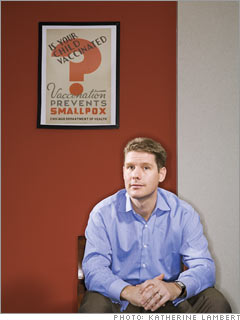The background: Avian flu, SARS, HIV/AIDS, and other diseases could wipe out entire populations. But early detection and quick response are tough in many developing countries.
The solution: A techie, a social entrepreneur, and a former government official teamed up to launch Voxiva, a real-time epidemic-tracking system for isolated places with little or no technology. Health-care workers access the network through the Web, cell phones, landlines, and even radio. Health authorities analyze their reports and respond. India purchased Voxiva to track the spread of disease after the tsunami, Rwanda is using it for HIV, and Indonesia has started a pilot program to help speed up reporting of avian flu.
The payoff: After five years the Washington-based firm has nearly 100 employees and offices in the United States, Peru, and India. Though privately held Voxiva won't disclose revenue, company officials say it's growing by double-digit percentages each year.
The opportunity: Tracking epidemics is just one emerging business. There is rising demand for long-distance learning systems (via phone or PC) that sharpen field workers' skills, and for systems that link big-city specialists with remote areas.

